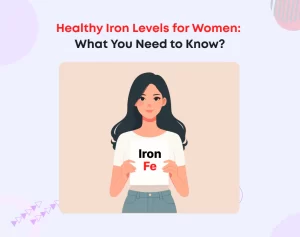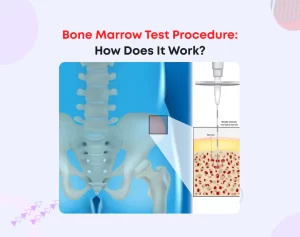
Healthy Iron Levels for Women: What You Need to Know?
Maintaining healthy iron levels is essential for every woman. Iron is essential for making hemoglobin, the protein in red blood cells responsible for transporting oxygen throughout the body. When your iron levels are low, you may feel constantly tired, weak, or even short of breath.
In this blog, we’ll explore the importance of healthy iron levels for women, what the ideal levels are, signs of deficiency, and how to naturally boost iron levels for better health and vitality.
Why Iron Is Important for Women?
Women need more iron than men due to monthly menstruation, pregnancy, and childbirth. Iron helps:
- Transport oxygen in the blood
- Maintain healthy skin, hair, and nails
- Support immune function
- Enhance mental focus and energy levels
Iron is especially vital during certain life stages—such as puberty, pregnancy, and menopause—when women’s iron demands fluctuate.
What Are Healthy Iron Levels for Women?
Iron levels are typically measured in terms of hemoglobin concentration or serum ferritin levels.
Here’s what’s considered normal:
| Test Type | Normal Range for Women |
| Hemoglobin | 12.0 to 15.5 g/dL |
| Serum Ferritin | 30 to 200 ng/mL |
Optimal ferritin levels for women are often around 50-100 ng/mL, especially for those experiencing symptoms of fatigue or hair thinning.
Too little iron? It may indicate the presence of iron deficiency anemia. Too much? You may have iron overload, which can be harmful to your liver and heart.
Common Causes of Low Iron in Women
Women are especially susceptible to iron deficiency because of various physiological changes and lifestyle influences:
Heavy Periods: Monthly blood loss can lower iron stores over time.
Pregnancy: Iron demands nearly double to support fetal growth and increased blood volume.
Poor Diet: Low intake of iron-rich foods can lead to insufficient levels.
Digestive Disorders: Conditions like celiac disease or IBS may reduce iron absorption.
Frequent Blood Donation: Giving blood regularly can deplete iron stores if not monitored.
Signs and Symptoms of Low Iron
Do you constantly feel tired for no clear reason? Iron deficiency could be the cause. Watch out for these symptoms:
- Persistent fatigue
- Pale skin
- Shortness of breath
- Brittle nails or hair loss
- Headaches or dizziness
- Cold hands and feet
- Cravings for non-food items (pica)
If you’re experiencing any of these, it’s wise to check your iron levels with a simple blood test.
How Much Iron Do Women Need Daily?
Daily iron requirements differ according to a woman’s age and life stage:
| Life Stage | Recommended Iron Intake |
| Teenage girls (14–18) | 15 mg/day |
| Adult women (19–50) | 18 mg/day |
| Pregnant women | 27 mg/day |
| Postmenopausal women | 8 mg/day |
Pregnant women require almost double the daily amount, making iron-rich nutrition or supplementation critical during this time.
Best Iron-Rich Foods for Women
Getting iron from your diet is the safest and most natural approach. There are two types of dietary iron:
Heme iron: Found in animal-based foods, easily absorbed.
Non-heme iron: Found in plant-based foods, less easily absorbed.
Top Heme Iron Sources:
- Red meat (beef, lamb)
- Chicken and turkey
- Liver (beef or chicken)
- Shellfish (clams, mussels, oysters)
Top Non-Heme Iron Sources:
- Spinach and kale
- Lentils and chickpeas
- Tofu and tempeh
- Fortified cereals and grains
- Pumpkin seeds and almonds
Tips to Increase Iron Absorption
It’s not just what you eat—it’s also how your body absorbs iron. Try these tips:
Pair with Vitamin C: Pair iron-rich foods with vitamin C sources like oranges, bell peppers, or strawberries to enhance iron absorption.
Avoid Tea and Coffee with Meals: They contain tannins that block iron uptake.
Cook in Cast Iron Pans: This can slightly increase the iron content of your food.
Separate Calcium from Iron: Don’t take calcium and iron supplements together; they compete for absorption.
Should You Take Iron Supplements?
Iron supplements are recommended only if you’re diagnosed with iron deficiency or anemia by a doctor. Taking supplements unnecessarily can cause:
- Constipation
- Nausea
- Stomach upset
- Iron overload (hemochromatosis)
Before starting any iron supplement, it’s important to consult with a healthcare professional.
When to Get Your Iron Levels Checked?
You should consider a blood test for iron if you:
- Have heavy or irregular periods
- Feel unusually tired or weak
- are trying to conceive or are already pregnant
- follows a vegan or vegetarian diet
- Have a history of anemia
Early diagnosis and correction can prevent long-term health issues and improve your overall well-being.
Final Thoughts
Maintaining healthy iron levels is essential for women at all stages of life. Iron supports everything from energy and immunity to hair growth and mood. By understanding your body’s needs, eating iron-rich foods, and getting regular checkups, you can keep your levels in a healthy range.
Start small—add leafy greens to your meals, cook with iron-rich ingredients, and listen to your body’s signals. A little awareness goes a long way toward living a healthier, more energetic life.






